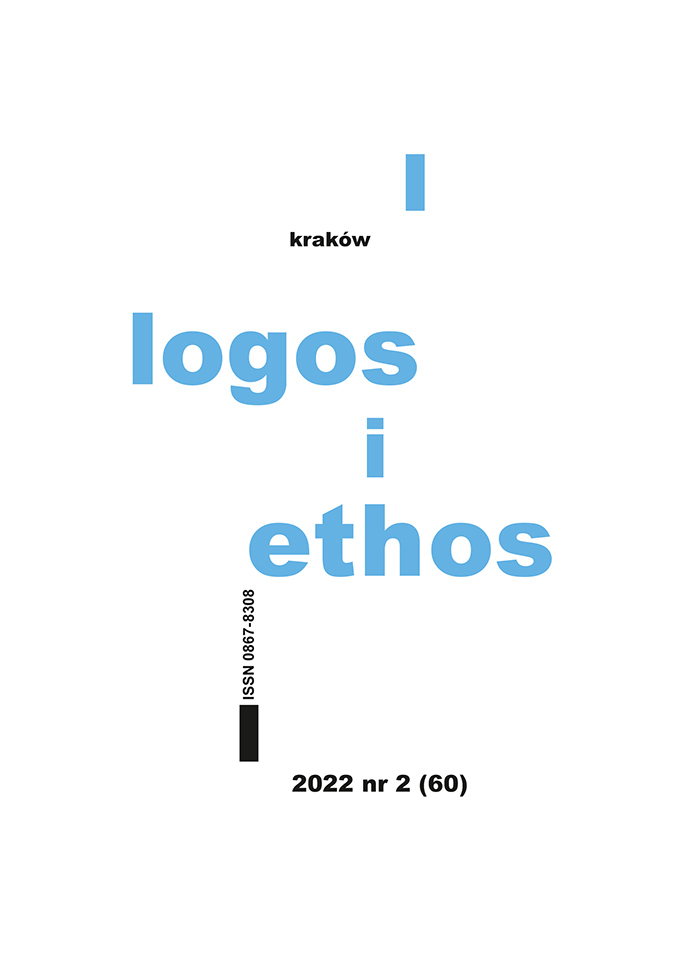Interpretacja kantowskiego pojęcia intuicji intelektualnej w myśli Xaviera Tilliette’a
DOI:
https://doi.org/10.15633/lie.60207Słowa kluczowe:
intuicja intelektualna, Immanuel Kant, Xavier Tilliette, idealizm niemiecki, współczesna filozofia francuskaAbstrakt
Artykuł koncentruje się na kantowskim rozumieniu pojęcia intuicji intelektualnej i jego interpretacji przez współczesnego francuskiego filozofa Xaviera Tilliette’a. Celem niniejszego artykułu jest przedstawienie i zbadanie zasadności poszukiwania wiedzy intuicyjnej w twórczości królewieckiego myśliciela oraz ukazanie rozumienia tego pojęcia przez Tilliette’a. Na początku omówiono kontekst powstania i definicję samego pojęcia, która w świetle twórczości Immanuela Kanta wydaje się kontrowersyjna. Ponadto zaprezentowano interpretację Tilliette’a: jako znawca niemieckiego idealizmu i spadkobierca francuskiej tradycji filozoficznej krytycznie przygląda się kantowskiemu rozumieniu tego pojęcia, wskazując na jego wieloznaczność i nakreślając problem niekonsekwencji jego użycia.
Bibliografia
Banaszkiewicz A., Między światem dostępnym zmysłom a transcendencją: Kanta krytyka rozumu jako próba nowego ufundowania metafizyki, Łódź 2013.
Cassirer E., Filozofia Oświecenia, tłum. T. Zatorski, Warszawa 2010.
Copleston F., Historia filozofii, t. 5, tłum. J. Pasek, Warszawa 2005.
Copleston F., Historia filozofii, t. 6, tłum. J. Pasek, Warszawa 2005.
Daszkiewicz W., Intuicja intelektualna w metafizyce, Lublin 2014.
Hajduk Z., Empiryzm, w: Powszechna encyklopedia filozofii, Lublin 2013.
Historisches Wörterbuch der Philosophie, Hrsg. J. Ritter, K. Gründer, Basel–Stuttgart 1976.
Hume D., Traktat o naturze ludzkiej, tłum. C. Znamierowski, Warszawa 1963.
Kant I., Krytyka czystego rozumu, tłum. R. Ingarden, Kęty 2001.
Kant I., Krytyka praktycznego rozumu, tłum. J. Gałecki, Warszawa 2002.
Kant I., Krytyka władzy sądzenia, tłum. J. Gałecki, Warszawa 2004.
Kilijanek M., Kant. Samoświadomość i poznanie dyskursywne, Poznań 2000.
Krąpiec M. A., Intuicja, w: Powszechna encyklopedia filozofii, Lublin 2013.
Leksykon filozofii klasycznej, Lublin 1997.
Paź B., Racjonalizm, w: Powszechna encyklopedia filozofii, Lublin 2013.
Półtawski A., Intuicjonistyczna epistemologia, w: Filozofia a nauka: zarys encyklopedyczny, red. M. Iżewska, Wrocław 1987.
Siemek M. J., Idea transcendentalizmu u Fichtego i Kanta: studium z dziejów filozoficznej problematyki wiedzy, Warszawa 1977.
Siemek M. J., Racjonalizm i naturalizm w filozofii niemieckiego Oświecenia, w: Filozofia niemieckiego Oświecenia, red. N. Szancer, Warszawa 1973.
Spinoza B., Etyka. W porządku geometrycznym dowiedziona, tłum. I. Myślicki, Warszawa 1927.
Szulakiewicz M., Obecność filozofii transcendentalnej, Toruń 2002.
Tilliette X., Recherches sur l’intuition intellectuelle de Kant à Hegel, Paris 1995.
Urban M., Hans Urs von Balthasar wobec idealizmu niemieckiego. Myśl chrześcijańska a refleksja filozoficzna, Kraków 2017.
Zdybicka Z. J., O intuicji w filozofii, „Roczniki Filozoficzne” 12 (1964) nr 1, s. 121–129.
Pobrania
Opublikowane
Numer
Dział
Licencja

Utwór dostępny jest na licencji Creative Commons Uznanie autorstwa 4.0 Międzynarodowe.
Autorzy publikujący w czasopiśmie udzielają jego wydawcy zgody o następującej treści:
- Autor zachowuje autorskie prawa majątkowe do utworu, a jednocześnie udziela wydawcy czasopisma zgody na jego pierwszą publikację w wersji drukowanej i wersji online na licencji Creative Commons Uznanie autorstwa 4.0 Międzynarodowe oraz zgody na wykonywanie opracowań, w tym przekładów.
- Autor ma możliwość udzielania zgody niewyłącznej na opublikowanie utworu w wersji, która ukazała się w czasopiśmie (np. zamieszczenia go w repozytorium instytucjonalnym lub opublikowania w książce), wraz z informacją o jego pierwszej publikacji w czasopiśmie.
- Autor może umieścić swój utwór online (np. w repozytorium instytucjonalnym lub na swojej stronie internetowej) jeszcze przed zgłoszeniem utworu do czasopisma.

